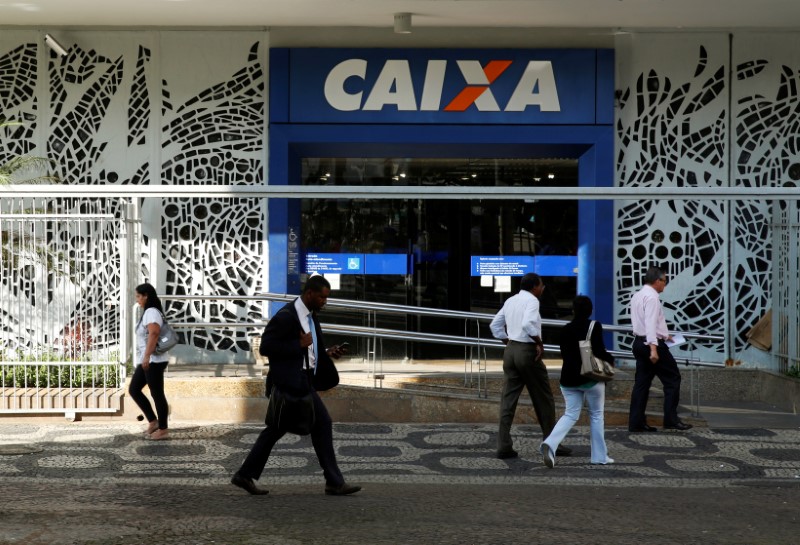By Aluisio Alves and Lisandra Paraguassu
SAO PAULO/BRASILIA (Reuters) - The Brazilian government has ordered state-controlled lender Caixa Econômica Federal to stop providing financing to a family of billionaires who accused President Michel Temer of working to obstruct a corruption probe, people familiar with the decision said on Tuesday.
According to two of the people, The Temer administration ordered management at Caixa not to refinance existing credit lines to J&F Investimentos SA, a holding company controlled by Brazil's Batista family. Members of the Batista family offered prosecutors proof last month that Temer allegedly worked to obstruct a major corruption probe.
One of the unnamed sources, who is a senior Temer government official, said under the condition of anonymity that ordering Caixa to stop doing business with J&F was in retaliation for accusations that Joesley Batista, a family member and then J&F's chairman, made against Temer.
Joesley Batista secretly taped a conversation in which Temer appeared to condone bribing a potential witness. J&F controls JBS SA, the world's No. 1 meatpacker, and several companies in the fashion, dairy, pulp and banking industries. Caixa is J&F's largest creditor with outstanding loans worth 9.7 billion reais ($3 billion), a third person said.
Caixa has set aside extra capital to reclassify some of the loans to J&F, after deeming them riskier than before, the same person said. The extra provisioning came after Caixa asserted control of unspecified collateral put forth by J&F for a merger financing loan it took two years ago, the person added.
The situation underscores the discretionary way in which state lenders are run in Brazil, and how borrowers are exposed to retaliation if they fall out of grace with the government. Caixa was used as a policy tool by Temer's predecessor, Dilma Rousseff, sparking heavy loan losses because of reckless lending and risk-taking decisions.
Caixa said it made extra provisions related to J&F, but did not elaborate on the reasons for the move. J&F declined to comment.
Temer's office said in an emailed statement to Reuters that "state banks take actions based exclusively on technical criteria," noting that "decisions based on other criteria than that count with no authorization from the president's office."
Brazil's Federal Supreme Court released plea bargain testimony on May 19 accusing Temer and his two predecessors of receiving bribes, the most damaging development yet in the nation's biggest ever corruption probe.
SURPRISING MOVE
At the core of the decision to restrict Caixa's business with J&F is a 2.7 billion-real loan that the Batista family took late in 2015 to buy a controlling stake in apparel and fashion branding firm Alpargatas SA (SA:ALPA4), the people said.
Losing Caixa as a key creditor means the Batistas will have to resort to other lenders or sell assets to raise cash for a heavy repayment calendar over the next year. One of the people said that companies controlled by J&F, excluding JBS, have about 14 billion reais of debt maturing over the next 12 months.
Analysts including JPMorgan (NYSE:JPM) Securities's Natalia Corfield have said that recent political and economic turmoil in Brazil risks slowing Caixa's efforts to reduce defaults and provisions.
Caixa's surprising move also set off warning signs among other banks that are also lenders to J&F, one of the people said. By winning control of more guarantees, Caixa raced ahead of other lenders and has a smaller chance of undertaking loan losses if J&F defaults, the same person added.
In a statement, J&F said it "does maintain long-term relationships with financial institutions," refraining from commenting further.
J&F, which stands for the initials of Joesley's parents José and Flora, agreed to pay a record-setting 10.3 billion-real fine for engaging in bribery, graft and other crimes. Joesley Batista's plea deal has sent shockwaves across Brazil's political and business establishments, and risks accelerating Temer's ouster from office, analysts said.
Most of the fine J&F will pay, or the equivalent of 8 billion reais, will be divided among Caixa, Brazil's development bank BNDES [BNDES.UL], a state-controlled severance fund known as FGTS as well as two pension funds for employees of state-controlled companies.
Reuters reported on May 22 that BNDES decided not to extend any new loans to JBS (SA:JBSS3) or J&F Investimentos until they signed a leniency agreement with federal prosecutors.
Pension funds and state-run banks invested in or extended loans to J&F companies in return for bribes paid by the Batista brothers, according to plea deal testimony.

(Writing and additional reporting by Guillermo Parra-Bernal; Editing by Daniel Flynn and Andrew Hay)